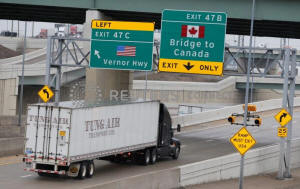U.S.-Canada border closed as Florida congressman diagnosed with
coronavirus
 Send a link to a friend
Send a link to a friend
 [March 19, 2020]
By Doina Chiacu and Laila Kearney [March 19, 2020]
By Doina Chiacu and Laila Kearney
WASHINGTON/NEW YORK (Reuters) - The United
States and Canada closed their shared border to "non-essential traffic"
on Wednesday to curb transmission of the coronavirus as U.S. President
Donald Trump moved to bolster medical equipment supplies and the
outbreak struck Capitol Hill.
Two members of the U.S. House representatives - Mario Diaz-Balart of
Florida and Ben McAdams of Utah - said on Wednesday they had each tested
positive for coronavirus, becoming the first lawmakers in Congress known
to have become infected.
The implications for Capitol Hill were not immediately clear. The news
came as the U.S. Senate passed legislation providing over $100 billion
in emergency spending for free coronavirus testing, paid sick leave and
expanded safety-net benefits.
Trump quickly signed the measure into law. Hours earlier, the Republican
president said he would invoke the Defense Production Act to allow the
government to accelerate production of medical equipment such as face
masks and other protective gear during the health crisis.

"It's a very tough situation here. You have to do things," Trump said as
he sought to escalate government action to address a public health
crisis that he had initially made light of but has more recently likened
to a war.
The defense statute, enacted in 1950 at the outset of the Korean War,
empowers the president to expand industrial production of key materials
or products for national security and other reasons.
Wall Street on Wednesday extended a four-week plunge in the face of
deepening concerns over a fast-spreading and potentially lethal
respiratory virus that has paralyzed large sectors of the U.S. economy
and led to fears of a global recession.
VIRUS IN ALL 50 STATES
The Trump administration has been criticized for a slow initial
response, with the United States now facing shortages of diagnostic
testing kits and other essential medical supplies.
With cases of the highly contagious respiratory illness caused by the
virus reported in all 50 states and the total number of known U.S.
infections closing in on 8,000, millions of Americans are staying at
home instead of commuting to work or going to school.
The U.S. death toll has climbed to at least 151.
New York, Washington state and California accounted for most of the
cases, with the largest cluster of U.S. deaths from the illness - 62 -
documented in the greater Seattle area.
California Governor Gavin Newsom said his state's massive homeless
population posed its own potential complications to the crisis. He cited
computer models showing more than 60,000 people living without shelter
in California could become ill with the coronavirus in the next eight
weeks, badly straining the state's healthcare system.
Trump said two U.S. Navy hospital ships would be pressed into service,
one to New York, the other on the West Coast. But U.S. defense officials
said one of them, the Comfort, was undergoing maintenance in Virginia
and it could take weeks before the vessel could head to New York Harbor.
Trump said closing the border with Canada for 30 days was by mutual
consent and would not affect trade.
[to top of second column]
|

A commercial truck heads for the Ambassador Bridge, during the
coronavirus disease (COVID-19) outbreak, at the international border
crossing, which connects with Windsor, Ontario, in Detroit,
Michigan, U.S., March 18, 2020. REUTERS/Rebecca Cook

The two nations share one of the world's largest trading
relationships, and their economies are highly integrated.
Canadian Prime Minister Justin Trudeau told reporters in Ottawa
travelers could no longer cross the border for recreation and
tourism.
"Our governments recognize it is critical that we preserve supply
chains between both countries," Trudeau added.
The U.S.-Mexico border would remain open, Trump said.
ECONOMIC STIMULUS
On top of the legislation signed into law on Wednesday, the Trump
administration, as part of a $1 trillion stimulus and rescue
proposal, asked Congress to approve $500 billion in cash payments to
taxpayers in two rounds - on April 6 and May 18. It is also seeking
$50 billion in loans to U.S. airlines, which have been pummeled by
the pandemic, according to a document seen by Reuters.
Some Senate Republicans have called for delivering $1,000 checks to
taxpayers, but Senate Democratic Leader Chuck Schumer said they
should receive more.
It remained unclear whether the coronavirus diagnosis of two House
members might hinder further congressional action.
Diaz-Balart, 58, a Republican, said he placed himself under
self-quarantine in Washington on Friday after appearing on the House
floor for a number of votes that day.
He said he developed a fever and headache on Saturday evening and
got a positive test result shortly thereafter.
McAdams, a 45-year-old Democrat, said in a statement from West
Jordan, Utah, that he had developed "mild cold-like" symptoms on
Saturday evening after returning from Washington and isolated
himself at home on Sunday.
He was tested for coronavirus at a local clinic on Tuesday after his
symptoms worsened, and learned he had tested positive on Wednesday,
McAdams said.
The House is due to return next week. House Speaker Nancy Pelosi's
office did not immediately respond to a request for comment.

(Reporting by Doina Chiacu and Susan Heavey in Washington and Maria
Caspani in New York; Additional reporting by Dan Whitcomb in Los
Angeles, Brendan O'Brien, Nathan Layne, Hilary Russ, Maria
Ponnezhath and David Ljunggren, Steve Holland, Jeff Mason and Idrees
Ali; Writing by Will Dunham and Steve Gorman; Editing by Bill
Tarrant, Bill Berkrot and Gerry Doyle)
[© 2020 Thomson Reuters. All rights
reserved.] Copyright 2020 Reuters. All rights reserved. This material may not be published,
broadcast, rewritten or redistributed.
Thompson Reuters is solely responsible for this content. |